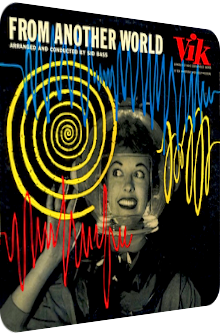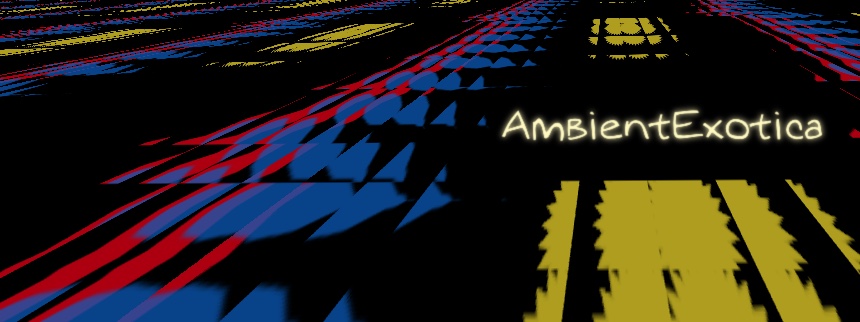
Sid Bass
From Another World
1956
From Another World is the attempt of orchestra leader and songwriter Sid Bass (1913–1993) to come up with a vivacious Space-Age album that both enchants and alienates the listener enough to make him or her feel uneasy and well-loved at the same time. The surroundings work to the album’s advantage indeed. Released in 1956 on the Vik label, the 12 interpretations of well-known compositions are all tied together by a common theme: weather phenomenons, moon-related serenades and otherworldly encounters, most likely with bewitching women. While From Another World doesn’t feature one single original tune, Sid Bass is able to color the gold standards in his own particular way.
The large orchestra not only features the standard collection of strings, horns and woodwinds, there is also a healthy amount of various mallet instruments and bells on board. They make for varied sceneries of romance, nights out in the bustling city and pipe dreams. All of these encounters, alas, are earthbound. The tone sequences and harmonies aren’t overly weird once the textures of a tune are firmly in place. However, there is an interesting tendency that makes the album worth the Space-Age fan’s while: the prefix and ending of each composition feature very interesting conflations of acoustics, surface-altering effects and mysticism. They frame the symphonic and big band-oriented songs most of the time, though there are genuinely prolonged whole trips of excitement included as well, making From Another World an accessible, euphonious artifact of the genre. A closer inspection is thus deserved.
And off we go with the title track that is already inspirational enough to keep the album spinning. From Another World is originally penned by Lorenz Hart and Richard Rodgers, transmogrified here into an eerie nullspace of neon helixes… at first. The prelude is indeed delightfully spacy and eldritch, comprising of whirling strings of suspension, echoey cymbals and glistening crystals. After 35 seconds, this exciting reticulation is already over and leads to a more streamlined interpretation of the source material. The brass layers, harps and flutes are mellifluous, the swinging rhythm romantic, and only the occasional warped string cascade and scything brass propulsion bring back the galactic notion here and there. E.Y. “Yip” Harburg’s and Burton Lane’s Old Devil Moon is even more streamlined. After a pulsating aureole of sub-zero frost, a perfectly earthbound guitar-centric cannelure opens up and lets the good old Friday night show tune atmosphere outshine all cosmic catenae. The xylophone and flute blotches are still offering a good punctilio in this setting.
Johnny Green’s and Edward Heyman’s Out Of Nowhere meanwhile features its fair share of spacy particles, but only via upwards spiraling string granulations and a wondrous stokehold aura at its end where metalization and engineering are united in a muffled contretemps. Afterwards, a stellar two-part medley comes into play, comprising of two compositions by Harold Arlen and Ted Koehler: Stormy Weather is actually a delightful Space-Age escapade supercharged with clandestine turbulences, aureate brass protuberances, heavily reverberated timpani tentacles and oneiric-surreal flute-based mirages of the Orient, whereas Ill Wind seamlessly connects to the tempestuous theme, although Sid Bass decidedly focuses on the mellower, more languorous string cascades, therefore making this a rather horticultural, nondestructive appendix which eventually leads to Nancy Hamilton’s and Morgan Lewis’ How High The Moon: a weird-uneasy mélange of vibes and echoey trombones leads to a bustling fast-paced tunnel vision of gorgeously piercing brass volcanoes, euphonious leeways and squally strings. Sid Bass’ interpretation is mercilessly effervescent and upbeat, there’s no time for contemplation.
Maybe there is time for contemplation after all, as it takes time to flip the vinyl and allow side B to enchant. But once it is spinning, a flurry of activity ensues again. Walter Donaldson’s and George Whiting’s My Blue Heaven only fakes the quasi-cajoling dark matter susurration of purple strings, as this mellow serration eventually leads to a surprisingly jazzy situation with a lead trumpet amidst cavalcades of brass layers and silver hi-hats. The shift away from the strings is a nice touch, but it’s no trend at all, as Brooks Bowman’s East Of The Sun (And West Of The Moon) greets the listener with an intermixture of strings and horns whose vanillarific entanglement is delightfully altered by echoey bursts within tawny glockenspiels and even benthic orchestra bells. It is a great arrangement, even leaving enough time for another cellar-like circumambience.
While Hoagy Carmichael’s and Mitchell Parish’s Stardust is a Space-Age fan’s dream due to the plinking vibes, glasses and diaphanous diorama overall, Eugene Lockhart’s and Ernest Seitz’s The World Is Waiting For The Sunrise returns to orchestra bell-backed tachycardia rhythms full of trombones and trumpets, also making sure that the song fades out in a dazzling, enigmatic string-infused manner. Vernon Duke’s and John Latouche’s Cabin In The Sky offers a standardized lilac waltz with trumpet protrusions in a particularly cosmic prelude and appendix, with W. Frank Harling’s, Leo Robin’s and Richard A. Whiting’s Beyond The Blue Horizon rounding the album off with buzzing strings which lead to an incandescently swinging brass serenade with glossy vibes and reduced string retrojections. There’s even time for a Haitian fife which adds a vestibule to – the back then uncoined genre – Exotica, and not a minute too soon.
Sid Bass’ From Another World is both a gimmicky and a successful Space-Age record, reciprocating between the needs of big band aficionados and fans of cosmic music, the latter of which is still in its infancy stages back in 1956. The primary arrangement trick faces the danger of growing stale after a while: the first few seconds and the final afterglow of each composition usually contain a variety of alienating sequences comprising echoes, prongs, weird harmonies, you name it. The effect is well-intended and its ambiance cajoling to the ears, but these instances only serve as frames for the normalized compositions. The material itself, however, is flawless and perfectly suited for a Space-Age album, as all the denotations of moons, skies and weather effects gracefully show.
There is a section of over seven coherent minutes that showcases the true power of both the polyhedric genre and Sid Bass’ album, and that is the two-song flowerage of Harold Arlen’s and Ted Koehler’s Stormy Weather and Ill Wind, both of which not only share a clima(c)tic sentiment, but function as spectacular, albeit way too short examples of vivid craftsmanship. The howling strings, the circadian circulation between pluvial sections, stormy cataracts and dulcet aesthetics allow the listener to take a peek of what From Another World could have become if these efforts had been followed through. It is only here that the formulaic spell is broken and an intriguing amalgamation of varied Space-Age superfluids presented. Sid Bass’ album remains a not so hidden classic though, as Smith & Co and RCA have reissued a remastered version on CD and as a digital download in 2014 and 2010 respectively, with streaming services catering to all interested parties as well.
Exotica Review 437: Sid Bass – From Another World (1956). Originally published on Jun. 13, 2015 at AmbientExotica.com.
